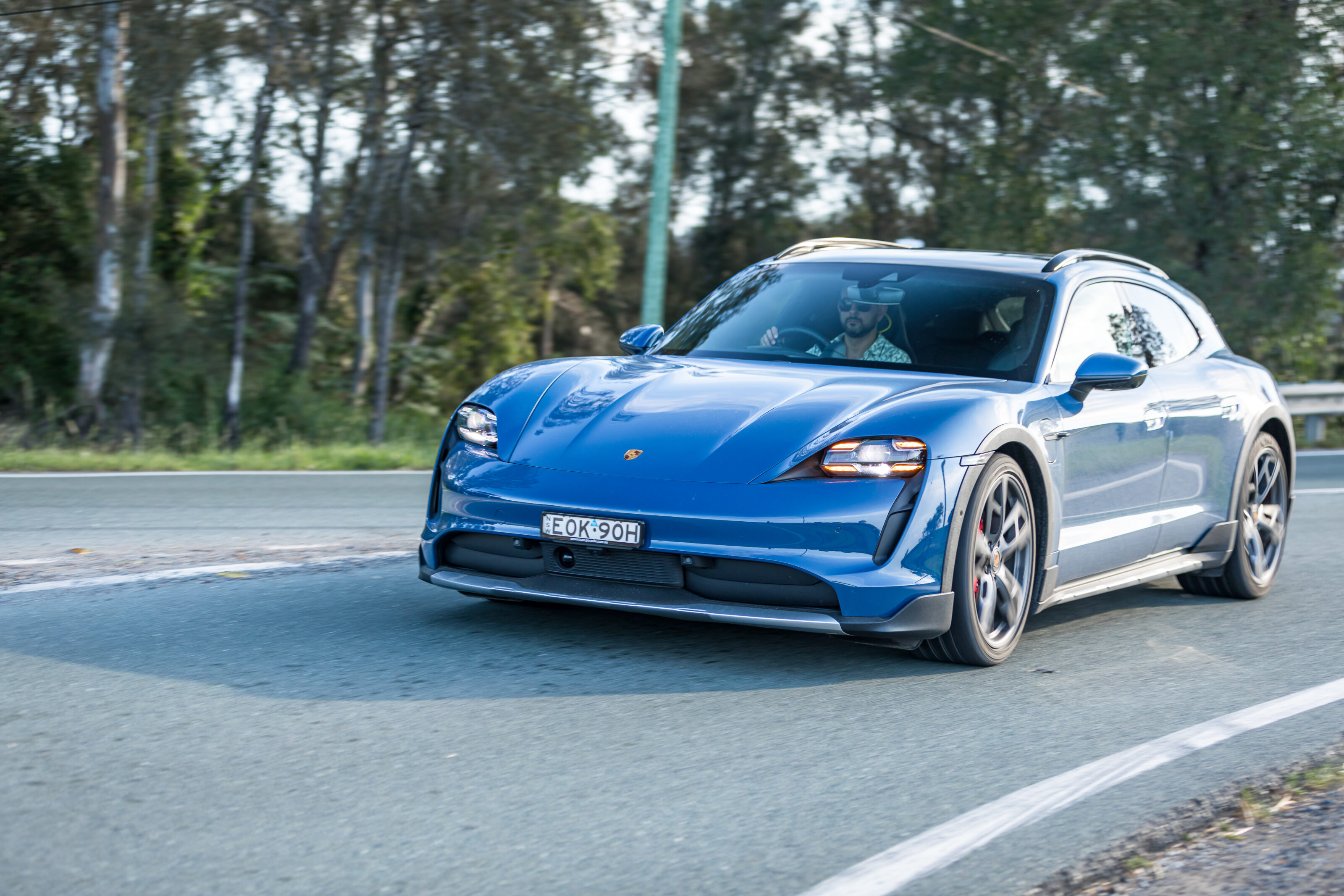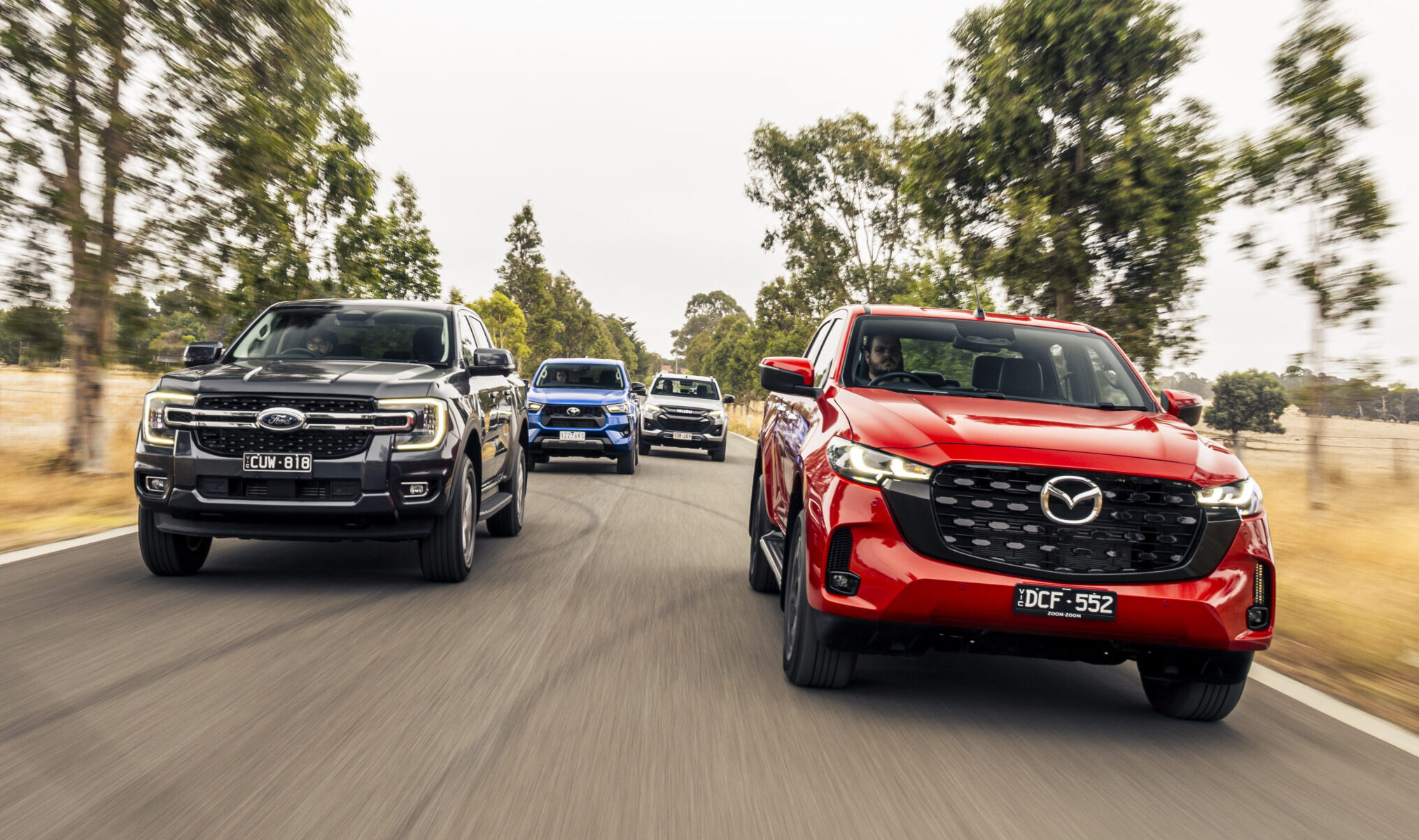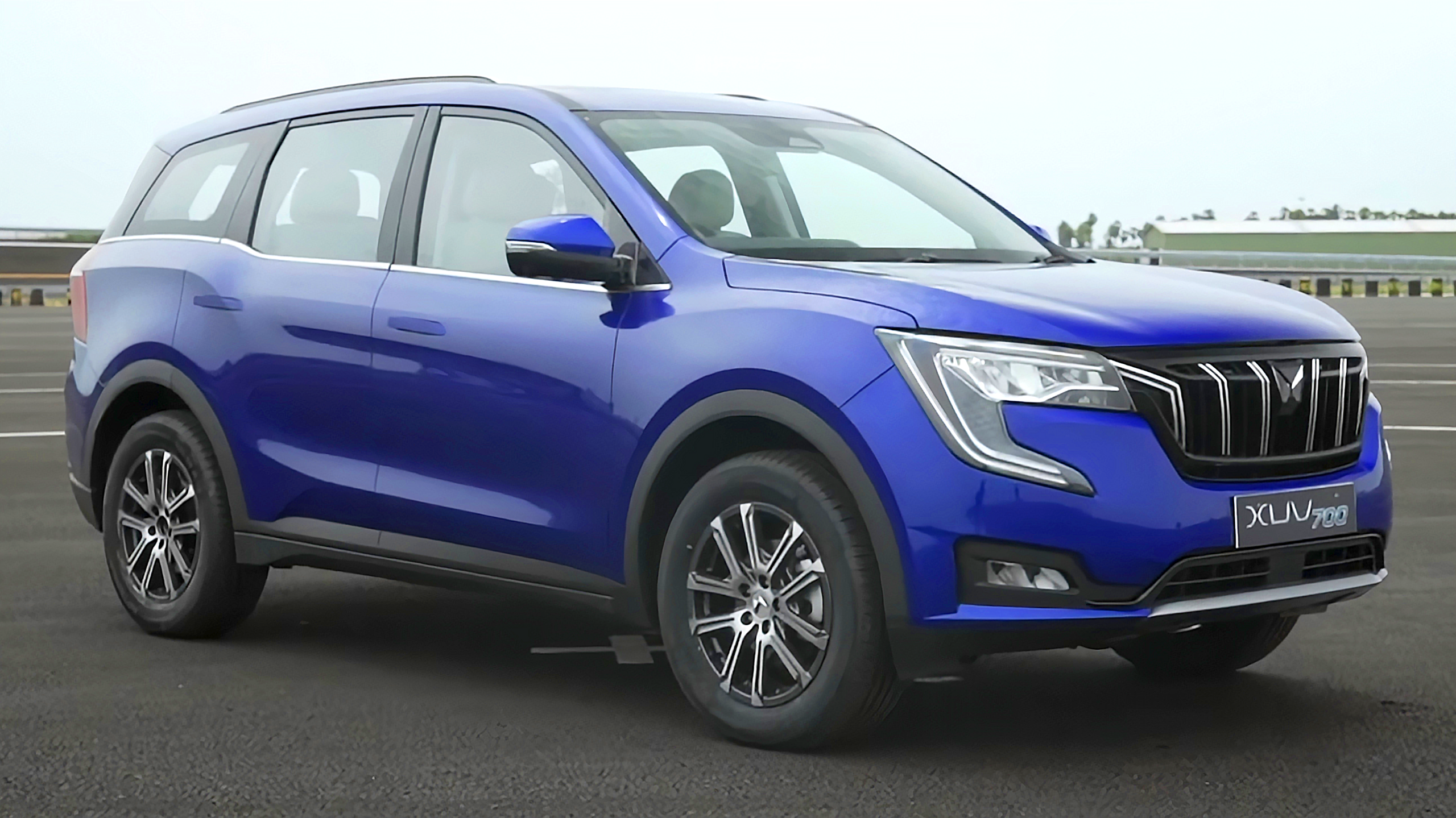Score breakdown
Things we like
- Breadth and depth of ability
- Super-fast charging is a game-changer
- Packed with easy-to-understand tech
Not so much
- Small boot considering it’s a massive car
- Poor outward visibility and reversing camera image
- Optional glass roof lets too much heat in
Driving an electric Porsche up a fire trail at the foot of Queensland’s Glass House Mountains is one of those unexpected bucket list moments, where the list simultaneously gains a new entry and a freshly ticked box.
In this environment, the 2021 Porsche Taycan 4S Cross Turismo is dispatching its duties with an almost smug nonchalance, revealing a spectrum of abilities as broad as the early morning shadow of nearby Mount Tibrogargan.
The situation has been engineered by snapper Matt Williams, whose tripod is regularly sunk into Cape York mud or Simpson Desert sand for shooting off-road vehicles with build costs approaching or even exceeding the $205,300 – before on-roads and options – showroom sticker of this Porsche (the drive-away price in most states is another $20K on top of that).
Water – or rather dust – off a duck’s back for Williams, then, but likewise the Cross Turismo on this terrain. With Gravel mode selected and the air suspension set to full grasshopper, it’s as surefooted as a Subaru but several orders of magnitude more responsive and luxurious.

By the time several laps of the trail are completed to Williams’ satisfaction and without the dreaded graunching of bodywork over crests and divots, I’ve stopped clenching and started enjoying.
All the Taycan’s impressive on-road dynamics and that point-and-squirt electric drivetrain translate to a lively and entertaining loose-surface experience, but also surprising comfort and ability, as well as a level of battery-powered serenity that feels appropriate out here in the bush.
Plus, to these eyes, it’s a wonderful looking thing. Sleek, voluptuous proportions make it seem tiny in the metal despite its footprint on the road – 2144mm mirror to mirror and 4974mm bumper to bumper – approaching that of a 300 Series LandCruiser.
Beyond a few off-roady accoutrements I’ll come to later, the Cross Turismo closely resembles the sedan – ahead of the B-Pillar, that is. Then that longroof form takes over, featuring the most extravagant haunches ever applied to a wagon (unless you reckon the Ferrari GTC4Lusso qualifies).

It’s hard not to love the three-quarter view, which especially pops in this car’s $5000 Neptune Blue paint finish.
Then again, it’s now dulled by a coating of dust from this unexpected off-road detour. And, as much as it’s nice to know the dirt track ability is there, neither Porsche, nor most Taycan Cross Turismo owners would seriously expect this type of driving to be a regular occurrence.
So what’s the latest electric Porsche – which promises to cement the Taycan’s position as Stuttgart’s third most-popular model in Australia – really like to live with?
Price and Features

Three Taycan Cross Turismo variants are offered, starting with the ‘4’ variant at $176,600 before on-road costs and options, and topped by the $279,000 Turbo.
Not quite splitting the difference is the 4S tested here, at $205,300.
Nothing directly competes with the longroof Taycan – who seriously thought anyone, let alone Porsche, would come up with a blisteringly quick jacked-up electric station wagon – though for reference a Tesla Model S Plaid and Audi RS6 Avant are both around the $220,000 mark after Luxury Car Tax but before on-road costs.
All Cross Turismos also have all-wheel drive via dual motors as standard, as well as the big 93.4kWh ‘Performance Battery Plus’ that is a hefty $11,590 cost option on the sedan. Given there’s a $10,600 price difference between the Taycan 4S sedan and 4S Cross Turismo, you’re a grand ahead by going for the wagon.
That ‘Turismo’ badging, in Porsche parlance, signifies the station wagon form factor. ‘Cross’ refers to the likely reaction of Porsche’s press office when it sees how filthy the car is in these photos and accompanying video.

Joking aside, ‘Cross’ indicates mild off-road ability, complete with black plastic wheelarch cladding, metal-look faux skid plates front and rear and, in the case of this car, the $3450 Off-road Design Package that raises the standard ride height by 10mm – 30mm loftier than the Taycan sedan – while adding extra black trim before and aft the wheelarches that looks more like additional aero than anything helpful in the dirt.
Perhaps at odds with the off-road package are our car’s optional inch-bigger 21-inch rims ($6770), finished in Vesuvius Grey (another $2500).
Considering Porsche put $42,670 of options on this 4S (and $41,690 worth on the Turbo I tried), the standard equipment list is pretty comprehensive.
Nothing directly competes with the longroof Taycan – who seriously thought anyone, let alone Porsche, would come up with a blisteringly quick jacked-up electric station wagon?

There are cooled (and heated) front seats in the 4S, and the steering wheel is also heated. The theory is that directly applying temperature to the human body is more energy-efficient than trying to battle cabin temperatures using the air-conditioning, heater or even the $1630 heat pump that promises better battery range in places that get properly cold during winter.
Dual-zone climate control with active carbon cabin air filtration is standard, or upgrading a 4S to the Turbo’s quad-zone setup with rear touchscreen controls costs $1720. Helping with air-con efficiency is thermally insulated window glass all round, with rear privacy tints.
A 14-speaker Bose stereo is standard on the 4S but a bit disappointing for quality at higher volumes (and it’s more than $10K to option the audiophile-spec Burmester).

Nearly everything is controlled via a trio of crisp digital screens; a gorgeous 16.8-inch curved unit for the instrument panel with touch-sensitive lighting and chassis controls at its outer edges, a 10.9-inch horizontal central touchscreen that controls most functions and a portrait centre console display for handwriting inputs, air-con settings, battery status and operating the two charging port covers (electric operation being a $1310 option).
Other highlights include height-adjustable air suspension – varying ground clearance from 146mm to 176mm with automatic GPS-based lift memory for those locations that never fail to cause the dreaded undercarriage crunch – and 14-way powered front seat adjustment with position memory and partial leather upholstery.
There’s also embedded internet access with Porsche Connect services, plenty of USB-C ports, powered tailgate and LED lighting throughout including the adaptive headlights.
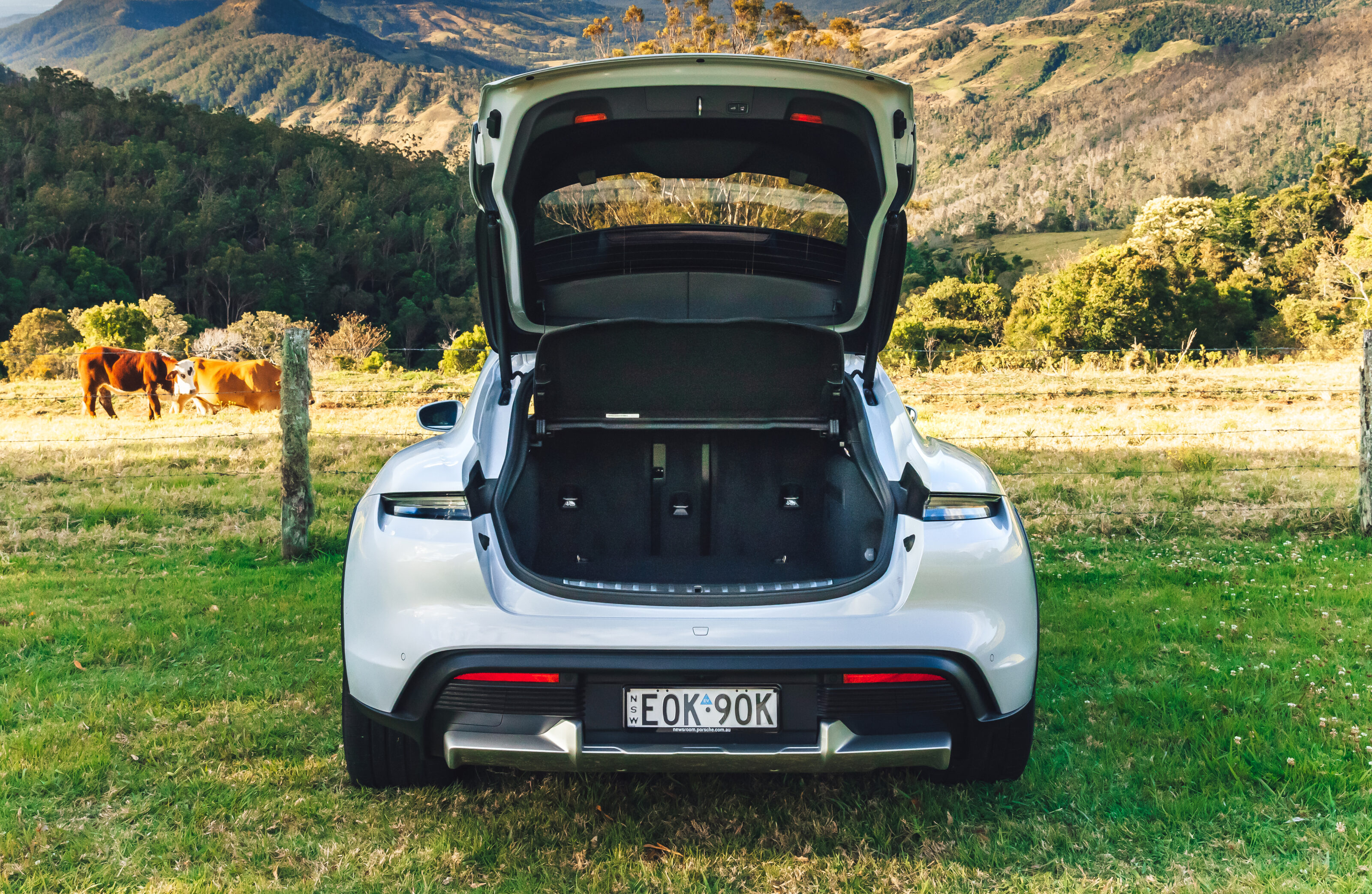
When said lights are on, a slim full-width illumination strip accentuates the Cross Turismo’s wide hips. Between them, our car bears translucent Glacier Iceblue Porsche lettering that is as cool as it sounds, matches the finish of the adaptive LED matrix headlights (a $4610 option) and is a relative snip at $1500.
Rounding out the cosmetic options on our tester are black aluminium roof rails ($1220), blacked in window trims ($720) and Porsche logo courtesy light projectors on all four doors ($600).
Of all the option boxes I’d tick on the 4S, the first two would be suede-like RaceTex pillar and ceiling treatment ($3970) plus extended stitched leather ($7540) that covers everything above waist height. Standard on the Turbo, they make the Cross Turismo feel truly special inside and their absence in the 4S made each journey feel like less of an occasion by comparison.
But I’d skip the Porsche crests on the headrests ($950), ambient lighting ($890) and Porsche logo LED courtesy lights ($600) fitted to this particular 4S. Oh, and I’d bin the $1050 Porsche Electric Sport Sound that costs more than a Dyson to make your car sound annoyingly like one.
Ownership Costs

Porsche claims a 436km driving range for the 4S (a kilometre less than the 4 and 11km more than the Turbo). The range estimate of our 4S got close to 400km on a full charge – much closer than the Turbo – but around 390km was realistic for everyday driving.
Compared with Porsche’s official 28.1kWh/100km combined energy consumption figure for the 4 and 4S, I averaged 26.4kWh/100km in mixed driving (the Turbo is rated at 28.7kWh/100km).
Fang it, though, and you’ll chew through electrons at an alarming rate. Applying the Range driving mode caps top speed to 90km/h or 130km/h (depending on how much battery is left) and runs the aircon a little less hard, increasing the distance-to-empty estimate by a tiny fraction but perhaps enough to reach that slightly too-distant charging station.
Good job, then, that this is one of the fastest-charging EVs on the market. With an 800V architecture and the ability to accept up to 270kW of DC juice from compatible hardware, zapping the battery from five per cent to 80 per cent takes less than 23 minutes.

Two such mega-chargers were conveniently located during our test. Achieving the full 270kW requires an ideal set of circumstances but the 4S pulled more than 260kW for a brief time, hovering around the 200-250kW mark and gaining around 150km of range every 10 minutes before slowing down as the battery reached the 80 per cent mark.
When not hanging around the car during charging for content purposes, in the 20 minutes it took for a quick toilet and snack stop on the way home from shooting the photos you see here, the 4S soaked up 63kWh of energy – more than two-thirds of total battery capacity – from the Chargefox network that provides new Taycan owners with three years of free charging.
Porsche claims a 436km battery range for the 4S. The range estimate of our 4S got close to 400km on a full charge – much closer than the Turbo.

No, it’s not as fast as pumping petrol or diesel but you are free to get other stuff done, meaning total stop time is around the same, provided one of these 800V chargers is available. More of them are popping up along major road-trip routes, most made by Brisbane-based manufacturer Tritium.
Outside of Chargefox, costs per kWh for public rapid charging vary from around 40 cents to 60 cents, the latter equivalent to about 10 cents per kilometre of range. It’s less than half that when charging at home, especially if you can use rooftop solar during the day.
For 400V charging stations, the Taycan tops out at 150kW – still at the high end – and the regular AC onboard charger can cope with up to 11kW for a nine-hour overnight charge from empty to 100 per cent. Our 4S was upgraded to the Turbo’s 22kW AC charger ($3500) that speeds things up if you have the compatible equipment at home or work.

Porsche also supplies a comprehensive set of charging cables, adapters and a huge, sophisticated portable transformer unit – with an in-built touchscreen!
Official servicing intervals for the Taycan are two years or 30,000km, whichever comes first. A prepaid three-year maintenance plan costs $2995 including two annual/15,000km check-ups and the full inspection (brakes, tyre sealant, fresh brake fluid and wiper blades, air-con treatment and wheel alignment).
A four-year plan is $4495 and five years costs $5495, with the full inspection happening at four years or 60,000km.
The warranty lasts just three years – including paint – while the battery is covered for eight years or 160,000km and Porsche guarantees against rust for 12 years.
Comfort & Convenience

The interior of both cars we drove were all black and had the $3370 panoramic glass roof, which comes with no blind and an inability to resist late-October sunshine here in South East Queensland that had me borrowing my kids’ stick-on window shades to place above my head.
On the upside, by the time the car has detected and welcomed your approach by unfolding the mirrors and popping out the flush-fitting doorhandles, it has already started altering the cabin temperature to the most recent setting.
The standard 14-way electrically adjusted ‘Comfort’ seats with three position memories provide an almost limitless combination of settings and they’re fundamentally comfy for long hauls.
A typically Porsche – as in excellent – driving position with an almost vertical steering wheel angle delivers a real sportscar feel, although at 188cm in height I’m still peering under the windscreen rail slightly even with the chair bottomed out.

The vertical dash fascia echoes Porsche’s heritage while being bang up-to-date with its wall-to-wall screens, especially if you have the optional passenger touchscreen. It might seem like a tech-fest but it’s beautifully integrated and straightforward to use; Porsche has clearly thought hard about how to pack in a lot of functionality without bewildering the driver with endless menus.
Unlike a Tesla, for instance, you don’t need to go on a course to figure out how it all works. Also unlike products of that Californian, sorry, Texan brand, the sense of quality and solidity inside the Taycan Cross Turismo is profound, as you’d hope and expect from this brand, at this price.
Unlike a Tesla, you don’t need to go on a course to figure out how it all works. Also … the sense of quality and solidity inside the Taycan Cross Turismo is profound.

All the screens are responsive and easy to navigate, the native software working so well that I found myself using Apple CarPlay less and less. And that speaks volumes. However, I failed to find a wireless phone charger in the car or on the options list. But at least CarPlay is wireless, and, to Porsche’s credit this was one of few cars in which it works properly.
Configurability of the driver’s display is immense and intuitive. You just scroll through each section using a button and roller on the steering wheel and click to open a submenu of info to display. Even better, configuring the excellent head-up display is achieved using exactly the same method.
I was wary about relying on a centre console screen for operating the air-con but needn’t have been. It also contains shortcut buttons for regularly used functions on the main screen, which itself has these sidebars providing quick access to stuff you’re likely to access often.

The aircon itself is really impressive as the airflow is unobtrusive, and though adjusting vent angles via the touchscreen is a gimmick, there’s a sense of luxury about being surrounded by air of a comfortable temperature, rather than being blasted by a stream of hot or cold.
Storage in the front of the Cross Turismo is adequate. The door bins will hold my big water bottle but the glovebox is skinny and the bin in the centre console is small, though more space is available on its lower deck and the cup holders are a good size.
The 4S I tested had the $2340 Sport Chrono package with compass – how adventure-oriented – that in addition to the dash-top display pod and lap timer puts a rotary drive mode selector dial on the steering wheel and the Sport Plus setting that turns this car into a bit of an animal.

Addressing criticism of the Taycan sedan, the Cross Turismo has 30mm more headroom in the back, according to Porsche, and it’s plenty for six-foot-something me.
Behind my own driving position, I have sufficient knee-room as well and the outboard seats are comfy. This car’s $1000 optional middle seat is temporary at best, token at worst, and a big lump in the floor forces manspreading, especially if the USB-C sockets directly beneath the occupant’s crotch are in use. But despite its taller cushion, there’s still just enough headroom for me here.
Storage is a bit on the slim side at the back, with no map pockets and thin door bins that’ll only hold little bottles plus a phone tray and a tiny shelf that might accommodate a box of matches, while the fold-down armrest houses a couple of cup-holders.
At 405L, it’s tiny for a wagon and provides less space than a Honda Civic hatch … If you fold the back seats down, boot space expands to 1171 litres.

Finally, the boot, which opens and closes automatically with a kick gesture, a button on the bumper or via the key fob. At 405L, it’s tiny for a wagon and provides less space than a Honda Civic hatch, although there is a handy underfloor compartment, a pair of deep troughs for shoes or other small items a phone-sized net pocket, a couple of elasticated securing straps, a 12V power outlet and decent tie-down points.
If you fold the back seats down, boot space expands to 1171 litres and another 84 litres is available under the bonnet, along with the puncture repair kit. The Taycan Cross Turismo doesn’t come with a spare tyre.
Safety

Unlike many Porsches, adaptive cruise control is standard on the Taycan. It also has lane-keep assist and most of the other driver-assist tech that’s standard on a $20K hatchback these days but long seen as non-essential in the eyes of Zuffenhausen.
The cruise and lane systems combine to provide traffic jam assist – the car does much of the work in slow, stop-start conditions – as well as warnings for when you’re tailgating or about to have an avoidable collision (including with pedestrians or cyclists) then automatically brakes to avoid or mitigate the crash.
Front and rear parking sensors are also included, along with a 360-degree camera system – but I’d recommend optioning the $1890 automated parking tech as manoeuvring visibility is hampered by the low-slung seating position that is well inboard of the curvy bodywork’s extremities, slim windows and the fishbowl rear camera that makes judging distances difficult.

On the move, however, forward visibility is fine, the Cross Turismo is easy to place and the standard blind-spot monitoring comes in handy as over-the-shoulder checks can be hit-and-miss.
But if you’re expecting a Tesla-like semi-autonomous experience, it’s absent from the Taycan. The car requires much more engagement than that, which could be Porsche brand values at work. An Audi e-Tron, for example, takes far more of the strain out of a long motorway journey.
If this is going to be your family wagon, there are child seat anchorages and ISOFIX mountings on the outboard seats. There’s room enough if the kids are old enough to be forward-facing or in boosters but the bulk of our youngest’s infant seat forced the front occupant to sit all the way forwards. Not great for taller parents.
There’s no ANCAP rating but Euro NCAP gave the Taycan five stars, applicable to all variants.
Performance

So long as the key is with you, the Taycan is ready to go as soon as your body hits the seat. Just select a gear and go.
And go it does. This 4S develops 360kW and 650Nm, the former boosted to 420Nm if you engage launch control to chase Porsche’s 4.1-second 0-100km/h or 12.2sec quarter-mile claims.
For context, the 4S is a full second quicker to the ton than the entry-level ‘4’ variant (280kW/400Nm, 350kW for launch control) and eight tenths behind the Turbo (460kW/850Nm, 500kW for launch control).
The 4 takes nine-tenths longer to cover the quarter while the Turbo demolishes it in 11.1sec, having passed 200km/h in just 10.7sec. But just 30km/h separates the top speeds of all three, the 4 topping out at 220km/h, the 4S 20km/h more than that and the Turbo mustering another 10km/h at the top end.
All well and good on paper, but how does it feel?

Neither the 4S or Turbo versions I drove produced that neck-snapping violence of a high-spec Tesla. The sensation of rapidly accumulating speed is all in your guts, which feel like they’re trying to exit via your mouth, and the feeling takes hours to leave you.
One of the more significant differences between the 4S and Turbo are the latter’s Porsche Surface Coated Brake setup, the distinctive mirror finish of its rotors promising – and delivering – monstrous stopping power.
The caveat is that they work better with a bit of temperature in them and, given Porsche’s philosophy regarding regenerative deceleration, you might end up entering a corner hot but with cold brakes.

It’ll only happen once and, suffice to say, the Taycan’s incredible agility and grip will likely reveal themselves in that moment.
This doesn’t seem to affect the 4S, but even after more than a fortnight, the jury is out on the Taycan’s regen.
On the one hand its default setting of no regen unless you use the brake pedal results in an enjoyable throttle-off sense of coasting with zero friction. On the other, brake pedal feel is more predictable and natural with the regen turned on – it’s still ever so slight – via a steering wheel button or selecting one of the Sport modes.

Under acceleration, the rear motor’s two-speed transmission can occasionally be felt doing its thing and it can be a bit shunty, particularly if it gets confused on looser surfaces or in heavy motorway traffic when you might vary speed in ways its logic is not expecting.
Apart from that, the Cross Turismo is wonderfully refined. Electric cars being quiet and smooth is a given but the almost complete lack of wind noise is remarkable. The only sounds that make their way through are road rumble from the big tyres and an occasional thump from the suspension.
How does it drive?

Once the novelty of that straight-line speed wears off and you’ve run out of mates to impress with it, I reckon the 4S is a more rewarding drive than the Turbo.
Despite both models wearing the same optional 21-inch alloys with 265/35 (front) and 305/30 (rear) Goodyear Eagle F1 Asymmetric 3 rubber, the 4S felt more nimble, alive, interactive and connected than the slightly aloof and overly capable-feeling Turbo when I drove the pair back-to-back on the same public roads.
The Turbo’s standard Porsche Torque Vectoring Plus and Porsche Dynamic Chassis Control Sport promise to make it more fun to drive, so perhaps it was their combination with the Turbo test car’s $4300 rear-axle steering option that seemed to dull the experience somewhat.
Or maybe, like its 911 counterpart, the Turbo is set up to deliver that ultimate grand tourer feel. In which case it nails the brief.

The primary ride was a bit busy on both the Cross Turismos I drove – due, I suspect, to the optional 21s – but there was also plenty of wheel travel, impressive compliance over larger impacts and a long-legged, settled gait on motorway journeys.
Yet the Cross Turismo is rock-solid in terms of body control, which remains true as speeds rise on a twisty bit of road, where body roll is contained with aplomb.
Of course, grip and traction are immense but for all the road feel in terms of surface texture that you constantly receive through the steering, what’s actually going on in terms of adhesion levels is less than telepathic.
But other than that, the steering is so sweet, it’s super smooth, accurate as you like and makes you feel at one with the car. The best EV steering, hands down.

For weighing more than 2.2 tonnes, this is a ridiculously athletic car, although the laws of physics will give you a bit of understeer – predictable and easily recoverable – when you start to overcook it on corner entry speed.
Then again, adopt a slow in, fast out approach and it digs in and flies. Unless the surface is wet and loose, in which case the more potent of the Taycan’s dual motors delivers some delightfully progressive power oversteer. Even with the stability and traction controls on.
So it’s a proper Porsche, then. Hats off to all those drivetrain and chassis calibration boffins who somehow made this car translate the terabytes of digital information that pass between driver, road and back again, into a car that feels so natural, so analogue.
But other than that, the steering is so sweet, it’s super smooth, accurate as you like and makes you feel at one with the car. The best EV steering, hands down.

For me, the single real dynamic fly in the ointment is that the only interaction you have with the Taycan Cross Turismo’s drivetrain is through the two pedals. Because it doesn’t even have paddleshifters to control the amount of regen for a sensation of engine braking as you come into a corner, it feels as though something is missing from the overall experience.
Porsche, rarely a brand to disappoint with product updates, is no doubt already working on a way of addressing this!
VERDICT

Everyone knows station wagons are versatile. Especially ones with a bit of extra ground clearance and all-wheel-drive, given only around 40 per cent of Australia’s public road network is sealed.
Combining all this with an excellent electric drivetrain and the level of luxury, performance and dynamic prowess we’ve come to expect from Porsche and the Taycan Cross Turismo succeeds in ticking as many boxes as it attempts to.
It has a few forgivable foibles, none of which are deal-breakers, and considering it combines all that Porsche-ness with a next-generation electric drivetrain and architecture, a $200K-plus price tag for the 4S starts to look like a lot of car for money.
Not only that, but if the Taycan Cross Turismo is within your budget, it could be all the car you need.
2022 Porsche Taycan 4S Cross Turismo specification
Score breakdown
Things we like
- Breadth and depth of ability
- Super-fast charging is a game-changer
- Packed with easy-to-understand tech
Not so much
- Small boot considering it’s a massive car
- Poor outward visibility and reversing camera image
- Optional glass roof lets too much heat in
We recommend
-
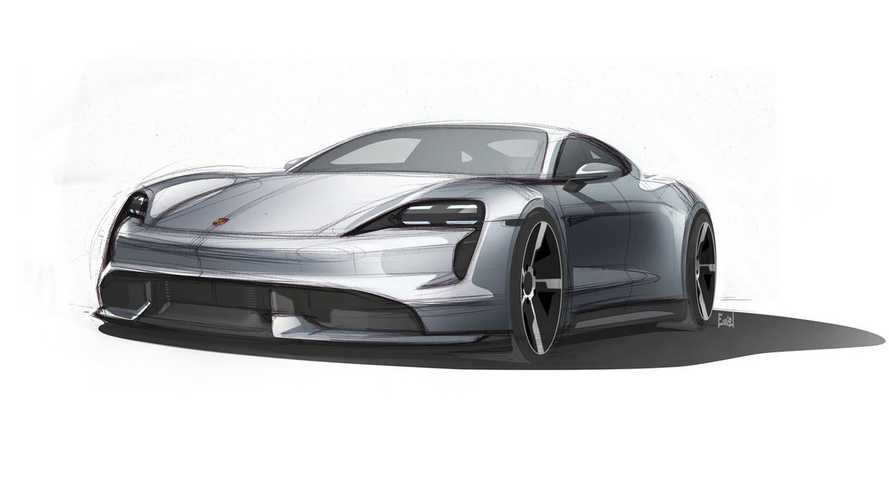 News
NewsWhat is the Porsche Taycan?
Everything you need to know about Porsche’s upcoming electric vehicle
-
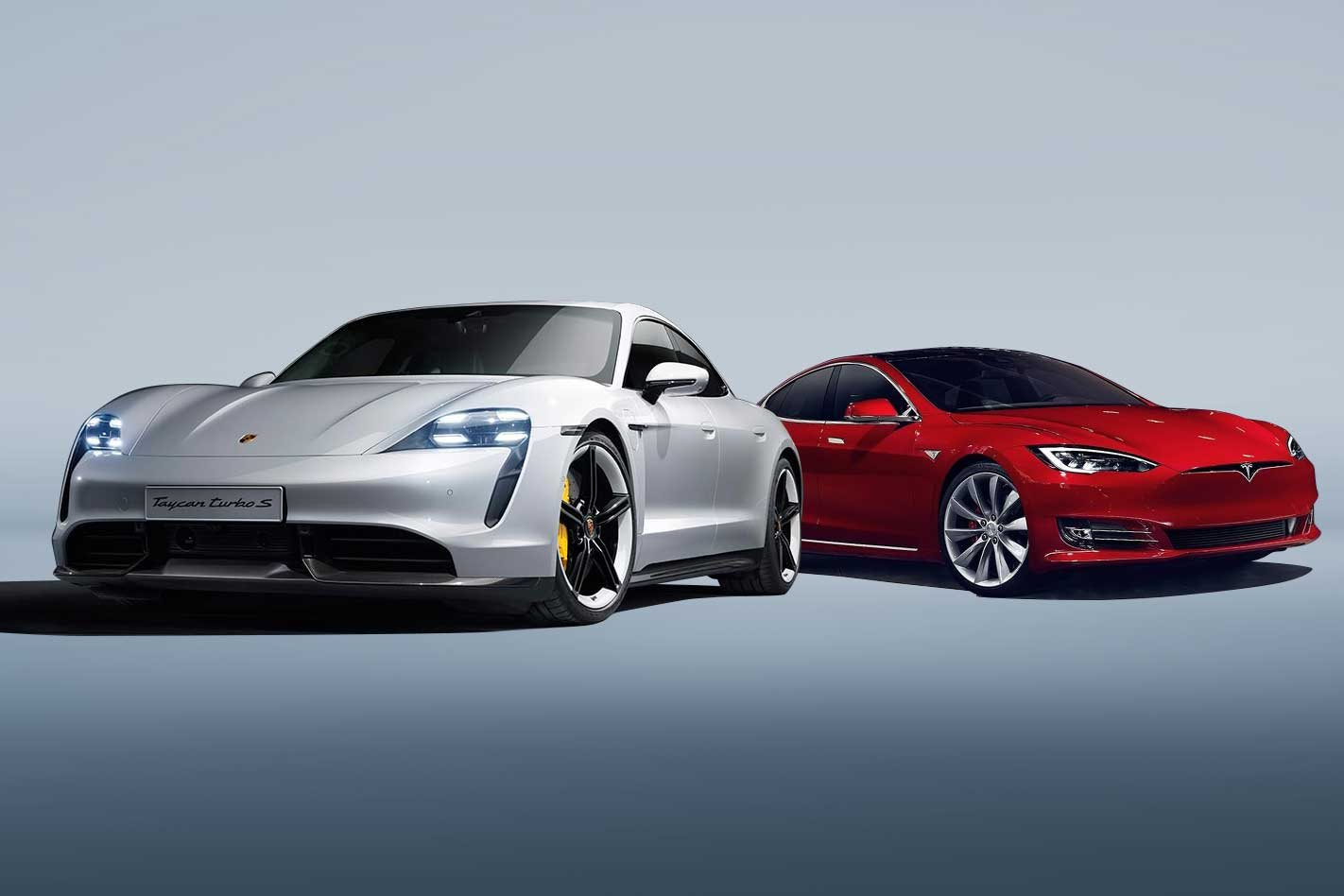 News
NewsPorsche Taycan vs Tesla Model S Performance spec comparison
Tesla and Porsche’s silent assassins compared on paper
-
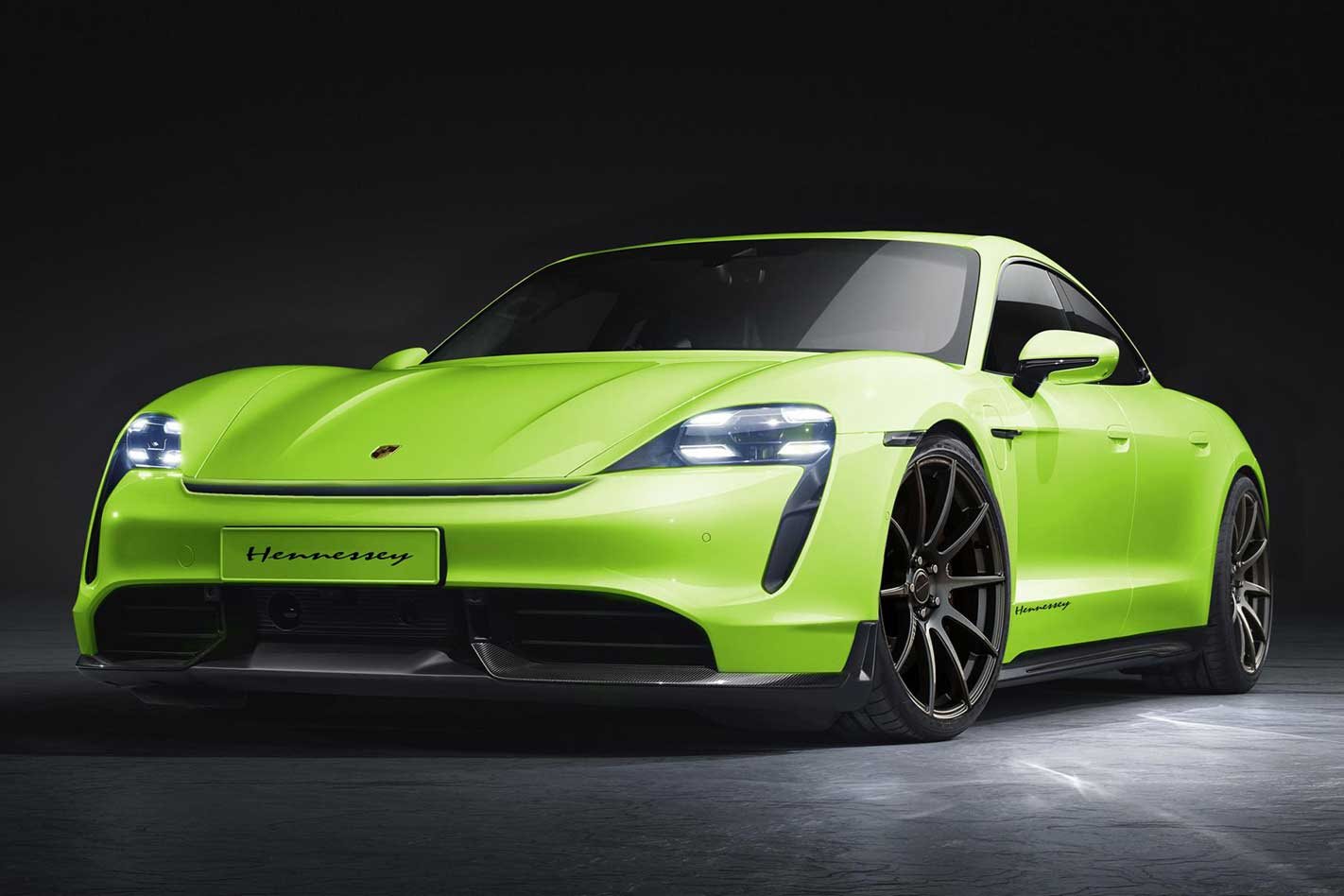 News
NewsHennessey amps up the Porsche Taycan
Porsche’s EV rocketship gets a bit of good ol’ down-home Texan hospitality

